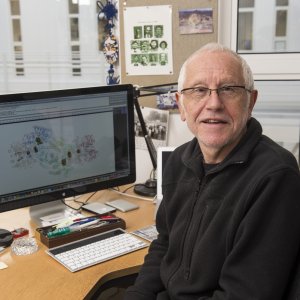Professor Ray Dixon
Group Leader Fellow of the Royal Society Co-Director JIC-CAS Centre of Excellence in Plant and Microbial Science
The Dixon group focuses on molecular understanding of biological nitrogen fixation in bacteria and its regulation in response to environmental cues.
Nitrogen-fixing bacteria are an essential component of the nitrogen cycle, a biological process that converts inert nitrogen into active molecules for use in plant and animal growth.
Ray studies how environmental signals, such as the presence of oxygen, fixed nitrogen and metal availability influence gene expression in nitrogen-fixing bacteria. These signalling mechanisms ensure efficient survival in nitrogen-depleted environments, but also can be potentially manipulated to increase fixed nitrogen supplied to crops.
While nitrogen fertilisers increase crop yields in overworked, nitrogen-depleted soils, they are also a major source of pollution and the greenhouse gas nitrous oxide. The engineering of new nitrogen-fixing bacteria could provide a biologically sustainable source of nitrogen to promote the growth of cereals.
Together with collaborators, Ray’s group also use synthetic biology approaches to define the minimal set of genetic determinants for nitrogen fixation that can be expressed in a eukaryotic host to produce active nitrogenase, with the long-term aim of directly engineering nitrogen fixation in plants.
Selected Publications
-
Tang Y, Qin D, Tian Z, Chen W, Ma Y, Wang J, Yang J, Yan D, Dixon R, Wang Y (2023)Diurnal switches in diazotrophic lifestyle increase nitrogen contribution to cereals.Nature communicationsPublisher's version: 2041-1723
-
Yang J, Xiang N, Liu Y, Guo C, Li C, Li H, Cai S, Dixon R, Wang Y (2023)Organelle-dependent polyprotein designs enable stoichiometric expression of nitrogen fixation components targeted to mitochondria.Proceedings of the National Academy of Sciences of the United States of AmericaPublisher's version: 0027-8424
-
Appia-Ayme C, Little R, Chandra G, de Oliveira, Bueno Batista, Dixon (2022)Interactions between paralogous bacterial enhancer binding proteins enable metal-dependent regulation of alternative nitrogenases in Azotobacter vinelandii.Molecular microbiologyPublisher's version: 0950-382X
